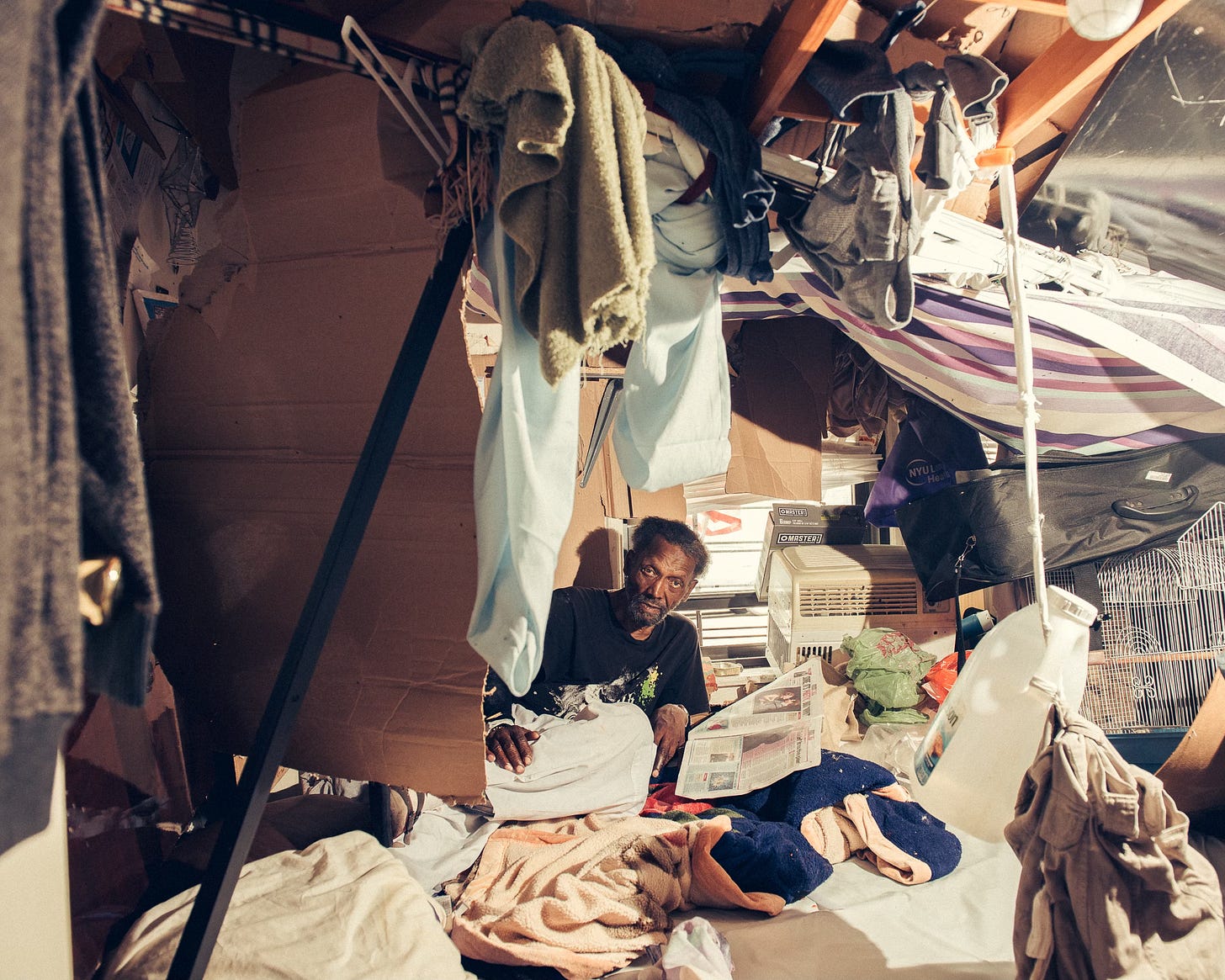The "SOME PEOPLE" Essays
Who is “He?” Who is “Us?” by George Etheredge | Edited by Kimberly J. Soenen
Working on this story, commissioned by ProPublica, required investigating a housing program intended to bring independence to New York City’s mentally ill people by transferring them out of adult homes and assisted living centers and into their own subsidized independent living apartments around the five boroughs of New York. My assignment was to examine the ways in which the program failed many people that it had originally intended to help.
On one of the first days covering this story, as the reporter and I walked into the building, I smelled a stench emanating from the first door to the left of the entrance. We knocked and yelled for Abraham, who eventually came to the broken door, which was barely hanging onto the hinges of the frame. He peeked his head out, yelled at us for a while, very confused, and then finally let us into his apartment.
Gnats swarmed around the entire apartment. The shower water and sink faucet were running, which Abraham said, “gives him oxygen.” A cantaloupe was squashed in the corner of the apartment. He made himself a plate of rice and chicken with gravy from a pan on his stove that looked as if it had been sitting out for days feeding both him and the insects that occupied the apartment. The stench of human waste and decomposing food filled the apartment. A wooden chair was in the shower being drenched by water, and his toilet was filled to the brim with feces. Abraham said the toilet was broken and he wasn’t using it anymore, so he had been defecating in his clothes. Scribbled writing was scattered across the walls, along with random trash. A piece of bread was nailed to the wall above his kitchen sink. Roaches scurried up and down walls and furniture.
I was struck by the fact that any policy meant to help people could leave someone so completely vulnerable. I felt sick afterwards for days. I later asked the writer if he had called anyone to try and help Abraham, but nobody could forcefully remove him from his apartment legally, we learned.
I returned home that night mentally exhausted and deeply disturbed. The memory of the odor inside that apartment flooded my senses. How can people like Abraham be abandoned and neglected by a system so flush with resources?
While we were there, Abraham grabbed a fan and told me it was his best friend. He told me a suitcase full of old newspaper advertisements was in fact money given to him by his father. He was having a conversation with his spoons.
How do I maintain faith in the systems supposedly there to take care of the most fragile people in society? Who is responsible? Who is accountable? Do all people deserve healthcare?
(Abraham Clemente in Flatbush, Brooklyn, August 21, 2018. Photo by George Etheredge.)
While back at home, I thought about my own circumstances. My great-uncle was admitted into a behavioral health ward because he thought he was a dog. My dad manages severe depression. One of his breakdowns ended what remained of my parents’ marriage. Other family members have suffered from addiction, substance abuse, and self-harm. These experiences have taught me that it is impossible for anybody to fathom what another person is living through. This awareness has made me both cautious and quiet. I suppose these experiences have taught me to treat everyone with respect rather than blame, with forgiveness rather than judgment, with support rather than marginalization.
For this photograph, I made a wide, environmental portrait that depicted Abraham in the center of the frame. I wanted a straightforward picture with full eye contact from the subject, so that there was no question of who and what the viewer should be focusing on in the frame. The pulled-back nature of the portrait feels less intrusive, intentionally creating distance between the viewer and the subject. What is inside of the frame and outside of the frame? Who is “He?” Who is “Us?”
Are we all as far away from Abraham as we think?
ABOUT
George Etheredge is a photographer from North Carolina, now based in New York City. Working within the documentary tradition, he focuses on exploring how social, cultural, and historical trends manifest in everyday American life. Alongside regular contributions to various editorial clients, he also dedicates his time to long-term series and commercial projects. Most recently, he produced a print sale fundraiser to support the North Carolina Hospitality Workers Relief Fund in his hometown of Asheville, North Carolina after the community was dvastated by Hurricane Helene. 100% of the donations directly supported North Carolina hospitality workers who were impacted by the storm. George regularly produces for the New York Times and other top-tier publications globally. For assignments and commissions visit his site.






